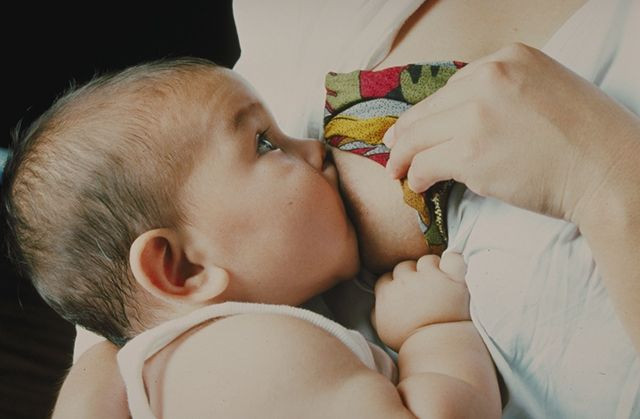Breastfeeding Diet: 7 Nutritious Foods For Mom To Satisfy Baby's Taste Buds

As a new mother who just gave birth to a hungry bundle of joy, eating a healthy nutritious diet is just as essential as it was when you were pregnant, especially, if you choose to breastfeed your baby. Like in pregnancy, eating for two is just as important after pregnancy to optimize your baby's health, as essential nutrients are passed from you to your baby.
Mothers who wish to breastfeed to achieve optimal growth, development and health for their baby, are recommended to exclusively breastfeed - the infant only receives breast milk and no other liquids or solids, which includes water. The World Health Organization suggests that mothers exclusively breastfeed their infant for the first six months to protect them from common childhood diseases and have longer-term benefits.
According to the Center for Disease Control and Prevention (CDC) 2013 Breastfeeding Report Card, 77 percent of U.S. infants now begin breastfeeding — an increase over 49 percent of infants born in 2010 who were breastfed. Although the discrepancy of how long a baby is breastfed still remains a topic of concern, the National Immunization Survey shows continued progress in mothers who choose to breastfeed their newborns.
If you made the decision to breastfeed, you need about 500 calories more than your pre-pregnancy intake to adequately breastfeed your baby, says Discovery Health. While breastfeeding, take in extra protein, calcium, nutrient and vitamin-rich foods, as well as extra fluids. Although there is no mandated diet a breastfeeding mother should follow, failure to meet your nutritional needs will indirectly impact your newborn. Traces of food and drink can sometimes get into breast milk, which can be detrimental to your baby's health if you have poor dieting habits, says BabyCentre, a pregnancy and parenting website.
To promote good health and satisfy you and your baby's taste buds during breastfeeding, include these seven nutritious foods in your diet and reap its benefits.
Read More: Breastfeeding Reduces Alzheimer's Risk — For Mothers
1. Milk
The act of breastfeeding requires a lot of energy and nutrients in the body, so boosting your calcium intake is a necessity to promote healthy bones. Your newborn depends on your breast milk for calcium which will help their bones develop. To meet your daily calcium requirements, it is important to include dairy products that are rich in calcium, like milk, in your diet. Meeting the daily value of calcium will help strengthen your baby's bones and prevent the weakening of your bones caused by the calcium demands during pregnancy, says eMedTV.com.
2. Non-Caffeinated And Non-Alcoholic Beverages
While nursing, many mothers may feel dehydrated, which indicates they need to increase their fluid intake. When a mom breastfeeds, the body will release oxytocin, a hormone that helps milk secretion and also makes mothers thirsty. The American Academy of Pediatrics (AAP) says caffeine is safe for breastfeeding moms, but since some may get into breast milk, it is important to consume caffeine in moderation. Women who breastfeed and drink more than two to three cups of coffee a day can make their baby prone to irritability and have trouble sleeping, according to the March of Dimes.
3. Legumes
While mom's iron supply is passed on to the baby through breast milk for the baby, she needs to ensure her iron levels are sufficient to avoid anemia. Iron-rich beans like black and kidney beans are a great source of nutrients, for both breastfeeding moms and vegetarians. Beans and legumes contain healthy bacteria and enzymes that help digestion, says Vegetarianwomen.com. Mothers who consume meat can also rely on red meat and chicken to rebuild their iron stores.
4. Leafy Greens
Green and leafy vegetables are excellent sources of vitamins and nutrients like vitamin A, calcium, vitamin C, and iron. Spinach and broccoli have high levels of vitamin A that can be beneficial for your newborn, even reducing their risk of death.
A study conducted by researchers from the Johns Hopkins School of Public Health found that a single, oral dose of vitamin A, given to infants shortly after birth can reduce their risk of death by 15 percent.
Read More: Breastfeeding Rates On The Rise, Should Mothers Follow A Specific Breastfeeding Diet?
5. Oranges
Breastfeeding mothers need a boost of energy to keep their bodies refreshed, replenished, and revitalized. Oranges are an excellent source of vitamin C, which is also present in breast milk. Mayo Clinic says breastfeeding mothers who consume vitamin C from foods are generally safe and don't require extra supplementation. Babies will get their vitamin C from breast milk and remain well-fed and nurtured.
6. Whole-Grains
Whole-grains contain folic acid, a nutrient that is essential for cellular growth, an essential process for a growing baby or a mother recovering from birth and pregnancy. Although folic acid is present in breast milk, the use of it during breastfeeding must be done under the supervision of qualified healthcare provider if taken as a supplement, states Mayo Clinic.
7. Wild Salmon Or Sardines
DHA-rich (docosahexaenoic acid) foods are considered to be healthy additions to any diet because of omega-3. Wild salmon or sardines can help promote your baby's brain growth. Salmon is considered a fish low in mercury, so the Food and Drug Administration (FDA) recommends that a pregnant woman eat no more than 12 ounces, equivalent to two servings, a week.
Read More: 5 Ways Newborn Breastfeeding Can Improve Your Baby's Health
For tips on breastfeeding for parents, visit BabyCenter.
Published by Medicaldaily.com



























